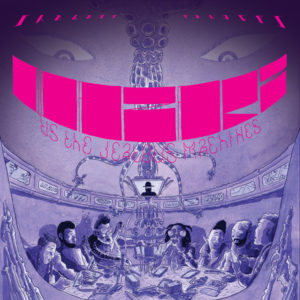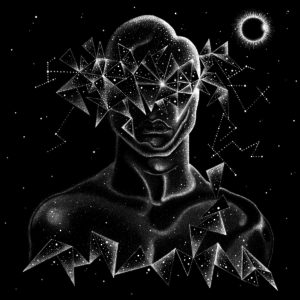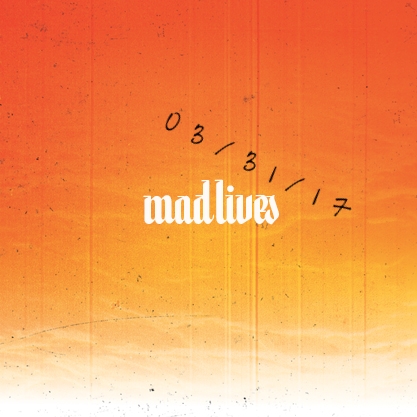

I’ve been navigating the sonic labyrinth that is Quazarz vs. the Jealous Machines and Quazarz: Born on a Gangster Star, the two-disc opus from hip-hop futurists Shabazz Palaces, for two months straight now. And in a lot of ways, I’m still happily lost in the damn thing.
A lot of genuinely great Northwest albums crossed my ears this year—sustained works from artists who actively created extended statements of purpose above and beyond just a handful of good-to-great songs. But Shabazz Palaces’ sprawling two-album suite (both Machines and Gangster Star were released simultaneously in July) is from another dimension entirely.
The two Quazarz releases form one concept album of sorts, with Ishmael Butler (AKA the Palaceer Lazaro) assuming the role of the title character, an alien emissary sent from his planet to observe the dystopian locale of ‘Amurderca.’ And what Quazarz sees ain’t always pretty. “Welcome to Quazarz,” Quazarz vs. the Jealous Robots’ opening track, finds one Amurdercan laying it bare to Quazarz amidst Shabazz beat maker Tendai Maraire’s skittering, cowbell-informed time-keeping. “I’m from the United States of Amurderca,” Butler deadpans. “We’re post-language, baby: We talk with guns. Guns keep us safe.”
Butler takes similarly pointed aim at other targets through the prism of Quazarz’s observations. The Jealous Machines of the first album’s title are, of course, the cell phones and other electronic devices increasingly devouring humans’ attention spans, and Butler decries those “glowing phantom limbs” amidst deceptively ethereal synth twinkles on “Gorgeous Sleeper Cell.” Elsewhere, “Self-Made Follownaire” catalogs a world full of fame-whores and “selfie stick samurais” pursuing celebrity for its own empty sake. And the thoroughly bad-ass “30 Clip Extension” cuts modern rappers down to size hilariously (‘He’s feeling numb, dressed dapper dumb…He’s fashioned by some unseen hand.”).

Shabazz Palaces: Mad geniuses. (photo: Tony Kay)
For all the pointed targets on Butler’s radar, though, there’s just as much abstraction, and that’s one of the things that makes Jealous Machines and Gangster Star so rich with each successive listen. The band’s definitely doing some world-building here (Jealous Machines even has its own comic book), but isn’t fixated on following a straightforward narrative. Butler/Lazaro’s words often work more as symbolic markers, tangents meant to further evoke the mood as much as set up a convergent storyline.
The music follows suit, often eschewing standard verse/chorus/verse structure in favor of building a cinematic vibe, then throwing in strange left turns. Jealous Machines’ “SS Quintessence” sports a sampled vocal hook that strongly resembles cartoon characters hiccuping, amidst a synth melody that keeps changing pace like a warped record playing at half-speed. And auto-tuned voices hiss and mutter like ghosts in the machine on Gangster Star’s instrumental “Déesse Du Sang.” There’s plenty of tunefulness throughout both albums, but it’s often under beds of electronic texture, a melange of real instruments, alien beats, and other weird sonic and lyrical tangents that burst to the surface when your ear least expects them.
This is as far from easy listening as you can get sometimes, and you’d think this crew’s aptitude for throughly mind-fucking a listener would be alienating. But real songs emerge from the cinematic flow of Shabazz’s surrealist dystopian hip-hop odyssey. “Julian’s Dream (Ode to a Bad)” is a hooky, sensual celebration of an especially enchanting object of affection, with a playful metaphoric fruit basket of lyrics, a beat that combines trap snaps with what sounds like mud flaps on a truck slapping repeatedly, and a synth hook that echoes vikings puffing away on battle horns. There’s no way in Hell it should work, but it does.
Both of these records were birthed under very different conditions. Jealous Machines was sculpted into shape over several months of treks to California to work with producer Sunny Levine, while Gangster Star was bashed out in two weeks in Seattle with frequent Shabazz producer Erik Blood behind the console. Despite their disparate origins, both records feel constructed to be listened to in their entirety together. You’re getting a surprisingly cohesive full-meal deal regardless of which record leads the playlist, but I’ve grown to prefer putting the (slightly) more disciplined Jealous Machines in the lead, followed by the more loose-limbed and autobiographical Gangster Star.
The relative spontaneity of the latter, originally a cluster of bonus cuts that ended up cohering into another album, may be why the Quazarz cycle’s two most accessible tunes emerged from those sessions. At its core the sinewy “Eel Dreams,” is a beguiling weld of INXS’s “Mediate” and the melodic hook from The Pet Shop Boys’ “West End Girls.” And the appropriately luminous “Shine a Light,” replete with a gorgeous string sample apparently nicked from “Theme to A Summer Place,” just might be Shabazz Palaces’ most pure-pop song yet.
Rest assured, though, that “Shine a Light”’s official video more than makes up for that prettiness by being unapologetically surreal, unsettling, and batshit nuts (seriously: listen to the song via the above link first, then check out the video afterwards and do not blame me for any accompanying nightmares). That spirit of defiant subversion, and some bold sonic exploration, is what made Quazarz vs. The Jealous Machines and Quazarz: Born on a Gangster Star the most immersive, imaginative, challenging, and exhilarating aural journey I took all year—hands down and mothership in the air.





